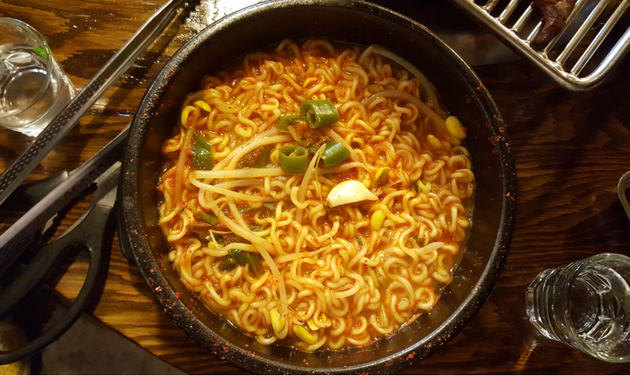Nov. 21 (NBD) -- The World Instant Noodles Association reported that China's demand for instant noodles has declined from 46.22 billion servings in 2013 to 38.52 billion servings in 2016, down 16.66 percent, whereas the demand had kept increasing from 2011 to 2013.
Meng Suhe, president of Chinese Institute of Food Science and Technology, once publicly stated that the instant noodles and other instant foods manufacturing industry had a lower profit growth rate than the average level of the entire food industry, which slowed down the development of instant food industry.
The downward trend can be best seen in the performance of major instant noodles manufacturers.
Master Kang (Kangshifu), for example, a top player in China's instant noodles sector, is regarded as the barometer for the performance of the industry.
According to the annual reports, the revenue of Master Kang's instant noodles sector grew from around 1.05 billion U.S. dollars in 2006 to 4.33 billion U.S. dollars in 2013. But the revenue started to drop from 2013, falling to 3.24 billion U.S. dollars in 2016.

Photo/Shetuwang
Rising online food delivery dealt a blow to instant noodles sales
Has the market of instant noodles hit its saturation point? Some industry insiders gave a negative answer.
Zhao Ping, director of the international trade research department at CCPIT Academy, analyzed that the reason behind the sales drop is the change of people's consumption patterns, saying that consumers have shifted their focus to healthy and nutritious meals from the food for simply "filling their belly".
It is noticed that the "unhealthy" tag on instant noodles hurts the industry to some degree, but that isn't the key factor causing the sales decline.
Only when the instant noodles' core advantages featuring convenient, fast and cheap are replaced by another business model, will its market position be hit significantly. Takeout food industry is a case in point, which started to rise sharply around 2013.
According to data released by a consulting agency iiMedia Research, the market size of online meals ordering in China has grown eightfold to 166.24 billion yuan (25.1 billion U.S. dollars) in 2016 from 21.68 billion yuan (3.3 billion U.S. dollars) in 2011.
iiMedia also predicted that the market size of China's online ordering sector would surpass 200 billion yuan (30.1 billion U.S. dollars) in 2017.
The data also shows that from 2012 to 2014, the online ordering market has expand rapidly with an average growth rate of 50 percent.
Wang Yaohong, former vice president of Baidu Waimai, the food delivery unit of Chinese search engine company Baidu Inc., explained to NBD that the online food delivery platforms sprouted in 2012 and formed scale effect in 2013, which enabled its market share to expand rapidly in 2014.
Wang believed that the fast expansion of the online meals ordering sector surely has dealt a heavy blow to the instant noodles industry. The instant noodles and the takeout food share similar functional property while the takeout food offers more choices, Wang added.

Photo/Shetuwang
Edges of online delivery over instant noodles
It is reported that Chinese people ordered 3.3 billion food deliveries in 2016. What makes takeout food a favorite? NBD interviewed several professionals to get some insights.
1. passive consumption VS proactive choice
Chanson Capital executive director Shen Meng told NBD that people used to buy instant noodles to just satisfy their hunger, which is passive consumption, whereas the takeout-food platforms offer various choices.
Food delivery platforms provide customers with participation consumption or experiential consumption, Shen added.
2. food safety
According to a survey on reasons for online takeout conducted by iiMedia Research, the top three are food safety, delivery time and special offers.
In terms of food safety, the instant noodles has long been labeled as unhealthy, while customers can make a judgment based on comments and pictures on the online delivery platforms.
But Wang Yaohong warned that food safety problems also exist in the takeout food sector. Once a problem is detected, the platform as well as the food producer should be held accountable, Wang suggested.
3. convenience
Hai Li, public relations officer of ele.me, a leading food delivery platform backed by Alibaba, said to NBD that the delivery time is one of the key factors affecting customers' experience.
Customers can enjoy their means once the food is arrived, saving them the trouble to making instant noodles.
4. price
The instant noodles surely has a price advantage over takeout food. But some experts said that with the transition and upgrading of people's consumption structure, it seems an arduous but fruitless path for the instant noodles industry to keep a low price.
With the progress in technology, traditional industries need to transform themselves, or they will not be able to overcome the challenges and threats posed by new business models.
Email: gaohan@nbd.com.cn


 川公网安备 51019002001991号
川公网安备 51019002001991号





